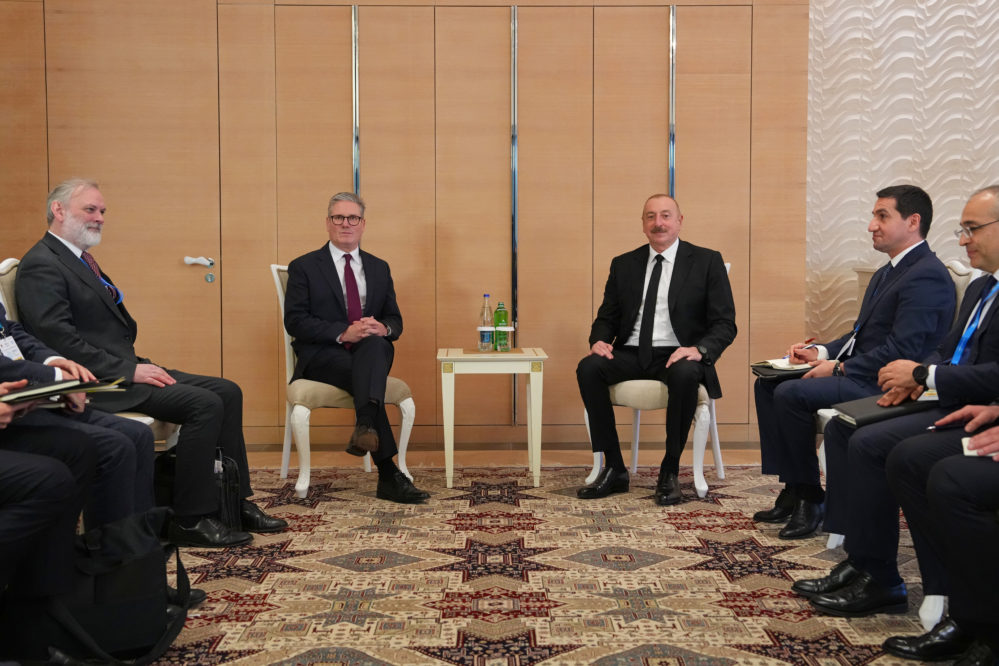Finance deal remains elusive at Cop29 as climate talks stretch into overtime

Diplomats have worked through the night to broker a deal on climate finance at the UN climate summit as negotiations stretched into overtime.
Negotiations at Cop29 in Baku, Azerbaijan, were scheduled to finish on Friday evening, but a final agreement remained elusive on Saturday afternoon local time, leaving a palpable atmosphere of frustration in the halls.
Contractors were already taking down the temporary buildings around the Olympic stadium, which had hosted the nearly two-week summit, as parties continued to wrangle over climate finance numbers
Polarised
Parties have been polarised during the course of the summit over thorny issues, how much rich countries should aim to pay poorer nations to help them cope with climate impacts, and how to move forward on previous agreements to cut climate-heating greenhouse gas emissions.
After days of deadlock on key issues, the host Azerbaijan presidency team released the latest draft for a global agreement on Friday afternoon, which indicated governments were closing in on a compromise.
The draft text included long-awaited specific numbers on climate finance, which meant countries could finally begin wrangling over the details of a deal.
A UK Government source on Friday afternoon said: “The current text doesn’t make the headway we are looking for, but gives us a platform to negotiate from.
“There is a hard but achievable path ahead in the final hours- and that is what we are focusing on.”
The core finance target put forward was 250 billion dollars in public money and a wider goal of 1.3 trillion dollars, including many types of finance, to be flowing into poorer countries each year by 2035.
Economists say at least one trillion US dollars in all kinds of finance is needed for poor countries per year by 2030 to meet the 2015 Paris Agreement goals to limit dangerous global warming.
The latest proposals place developed countries – such as the UK, US, European nations and Australia – as “taking the lead” on providing this money to poorer nations.
Under the draft text, other developing countries are invited to provide “additional contributions” towards the public money target of 250 billion US dollars.
Debate
Parties had fiercely debated who should contribute to climate finance, with developed countries arguing that some high-emitting developing nations, such as the Gulf states and China, should also be made to pay.
The proposed text also mentions last year’s pledge to “transition away from fossil fuels in energy systems”.
Reaffirming and building on this pledge has been another key sticking point during the summit, with significant pushback coming from some oil-rich countries like Saudi Arabia.
The proposals have faced fierce criticism from developing economies, which have been seeking an overarching target of 1.3 trillion dollars a year from 2025 to 2035 and a much higher commitment within that for public finance.
Jasper Inventor, head of the Cop29 Greenpeace delegation, said the climate finance text was “inadequate, divorced from the reality of climate impacts and outrageously below the needs of developing countries”.
Speaking ahead of the publication of the draft texts on Friday, UK Energy Secretary Ed Miliband said the country wants to see an agreement that “accelerates the clean energy transition”
He compared the “torturous” negotiations to playing “198-dimensional chess”, but remained optimistic that a good deal would be brokered.
Target
In a joint statement, UN-appointed advisors Amar Bhattacharya, Vera Songwe, and Nicholas Stern said the proposed 1.3-trillion-dollar-a-year target was in line with their analysis of what was needed to meet the goals of the Paris Agreement.
But they added that the sub-goal of 250 billion a year in public finance by 2035 was “too low and not consistent with delivery of the Paris Agreement”.
Green groups responded angrily to the proposed climate finance package, with Jasper Inventor, head of the Greenpeace Delegation, calling it “inadequate” and “divorced from the reality of climate impacts and outrageously below the needs of developing countries”.
Stephen Cornelius, WWF deputy global climate and energy lead, said there will likely be “fireworks” during the late-stage negotiations.
“While the text accurately recognises the climate finance needs of developing countries, the public finance commitment and timeline don’t come close to meeting them,” he said.
Support our Nation today
For the price of a cup of coffee a month you can help us create an independent, not-for-profit, national news service for the people of Wales, by the people of Wales.






Bit of a joke to hold it in this country, cop has become a junket we need to re form into something decent.
The wheels are about to come off the Net Zero crazy train. The emergency backstop had to be activated just a few weeks ago due to too little wind & solar. Expect blackouts & energy rationing within 24 months maximum – probably a lot sooner. Boilers and heat pumps will stop working and people will die as a result. Politicians are in complete denial about the reality of where we’re headed. Miliband, a nutcase who’s gambled his entire ego on doing something that cannot be done, will be unceremoniously sacked, and the Labour Party will have to face the reality… Read more »